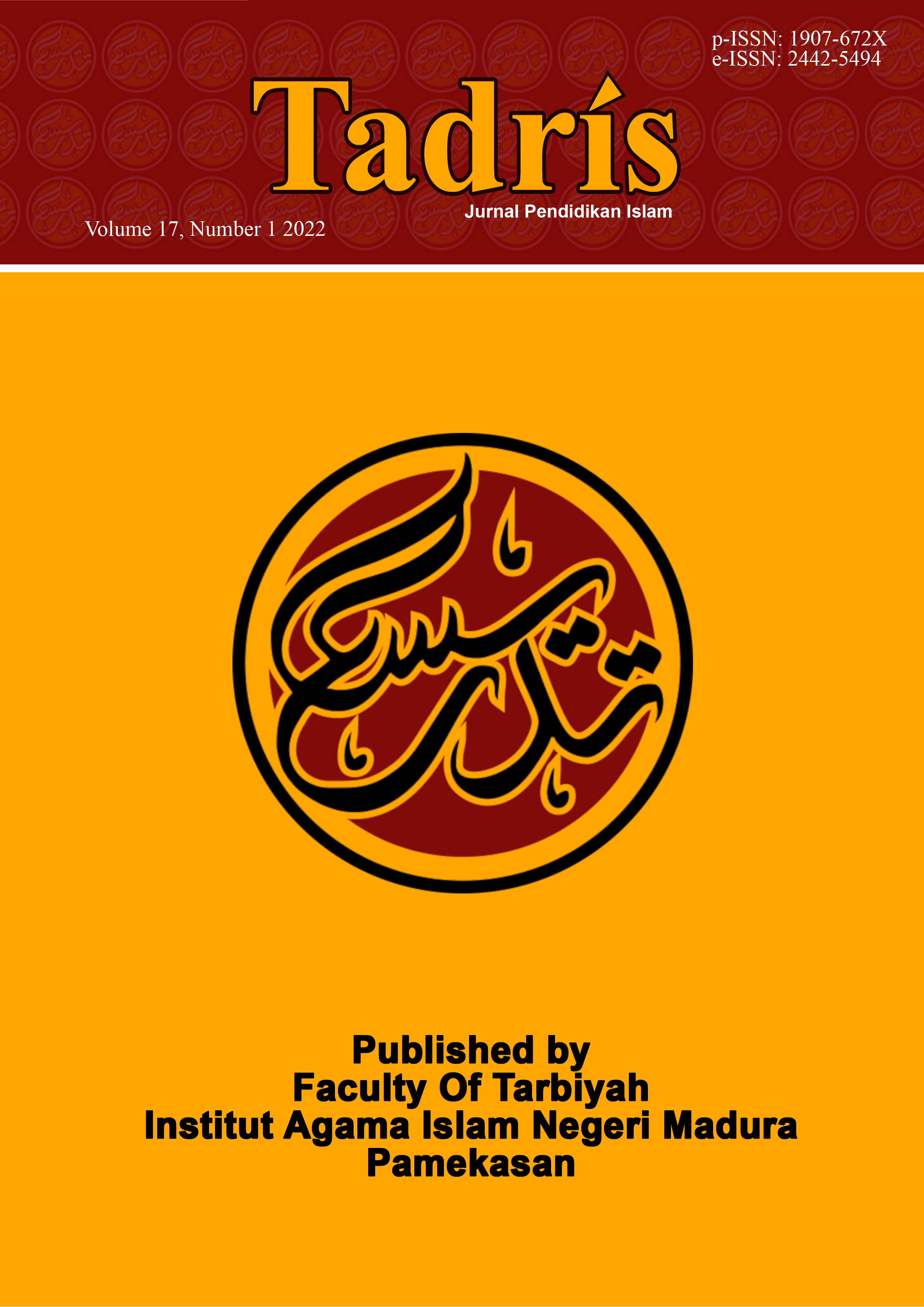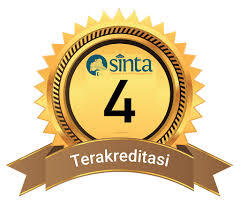Modernization of Education: a New Approach and Method in Learning Islamic Religious Education
 Abstract views: 1393
,
Abstract views: 1393
,
 PDF downloads: 921
PDF downloads: 921
Abstract
The purpose of this study is to describe Islamic religious education as the main subject taught at various levels of educational units that are facing serious problems, namely the threat of modernization that changes all human life in various fields, including education, in the era of modernization education is required to be responsive in overcoming various problems. faced by humans, education is faced with the demands of modern humans who want education graduates to master various fields and expertise. This research is qualitative research using exploratory research. The data analysis technique used phenomenological analysis and data collection methods in this study using observation, in-depth interviews, and documentation studies. The results of this study need to reformulate the education system based on the needs of modern society, one of the strategic steps is to change the approach and learning method of Islamic religious education in schools from the old model to the new model and this effort has already been carried out by superior schools in Indonesia, especially by schools. Islamic Senior High School Al-Azhar 1 Jakarta in the field of PAI studies which has benchmarks of success and five approaches in learning Islamic Religious Education including the following approaches: first, experience; second, habituation; third, Emotional; fourth, Rational; and Fifth, Functional. As well as creating special methods for each material in the Islamic Religious Education curriculum. The methods of the material are: first, the method of teaching faith; second, worship; third, morality; fourth, the history of Islamic culture; Fifth, the Qur'an.
Downloads
References
A. Malik Fadjar, Visi Pembaruan Pendidikan Islam, 91, lihat juga dalam A. Malik Fadjar, Reorientasi Pendidikan Islam (Jakarta : Fajar Dunia, 1999), 69.
Abdul Majid dan Dian Andayani, Pendidikan Agama Islam Berbasis Kompetensi, Konsep dan Implementasi Kurikulum 2004, (Bandung : Rosda, 2006),Cet. Ke-3, h. 1-2.
Abuddin Nata, Filsafat Pendidikan Islam (Jakarta: UIN Jakarta Press, 2002), 147.
Abuddin Nata, Filsafat Pendidikan Islam, Edisi Revisi (Pamulang : Gaya Media Pratama, 2005), Cet. Ke-1, 248.
Abuddin Nata, Kapita Selekta Pendidikan Islam (Bandung : Angkasa, 2003), Cet. Ke-3, 189.
Abuddin Nata, Pemikiran Pendidikan Islam & Barat (Jakarta : PT.Raja Grafindo Persada, 2012), Cet. Ke-1, 1.
Ali Mudlofir, Aplikasi Pengembangan Kurikulum Tingkat Satuan Pendidikan dan Bahan Ajar Dalam Pendidikan Agama Islam (Jakarta : Rajawali Press, 2011), 54.
Arief, Armai. "Pengembangan pendidikan budaya dan karakter bangsa dalam upaya menghadapi tantangan global." TARBIYA: Journal of Education in Muslim Society 1, no. 2 (2014): 215-226.
Badruzzaman Busyairi, Setengah Abad Al-Azhar 7 April 1952-7 April 2002. Jakarta: Yayasan Pesantren Islam Al-Azhar, 2002, Cet. Ke-1, 105-106.
Burga, Muhammad Alqadri, and Muljono Damopolii. "Eksistensi Pondok Pesantren DDI Mangkoso sebagai Lembaga Pendidikan Islam Tradisional: Studi pada Masa Pandemi Covid-19." TADRIS: Jurnal Pendidikan Islam 16, no. 2 (2021): 317-336.
C.Y. Glock dan R. Sterk dalam Mundzier Suparta, Pendidikan Kedewasaan Beragama (Pamulang : Gifani Aalfatana Sejahtera, 2009), Cet. ke-1, 23.
Carol A. Bailey. A Guide to Qualitative Field Research (Thousand Oaks, CA: Pine Forge Press, 2006), 1.
Conny R. Semiawan. Metodologi Penelitian Kualitatif (Jakarta: Grasindo, 2010), 7.
Daniel Goelman, Kecerdasan Emosional (Jakarta : PT. Gramedia Pustaka Utama, 1999), Cet. Ke-9, 38.
Drost, SJ, dari KBK (Kurikulum Bertujuan Kompetensi), sampai (Manajemen Berbasis Sekolah) MBS (Jakarta : Kompas Media Nusantara, 2006), 48.
Edgar Dale, Audio Visual Methods in Teaching (New : York : The Dryden Press, 1954), 23-42
Fazlur Rahman, Membuka Pintu Ijtihad, Penerjemah: Anas Mahyuddin, (Bandung: Pustaka, 1995), 211-222.
Haidar Putra Daulay, Dinamika Pendidikan Islam di Asia Tenggara (Jakarta : Rineka Cipta, 2009), 59,92,113.
Haidar Putra Daulay, Pendidikan Islam dalam Sistem Pendidikan Nasional di Indonesia Edisi Revisi (Jakarta : Kencana, 2012), Cet. Ke-3, 75-76.
Hasan Langgulung, Pendidikan Islam dalam Abad Ke 21 (Jakarta: Pustaka al-Husna Baru, 2003), 4.
Howard Gardner, The dicipline mind : What all student should Understand (New York : Simon & Schuster Inc, 1999)
Jhon W. Creswell, Qualitative Inquiry and Research Design: Choosing Among Five Approaches (California: Sage Publications Inc., 2017), 282.
Lukman Hakiem, Enam Puluh Tahun YPI Al-Azhar; 7 April 1952-7 April 2012 (Jakarta : YPI, 2012), Cet. Ke-1, 7.
M. Agus Nuryatmo, Mazhab Pendidikan Kritis, Menyingkap Relasi Pengetahuan Politik dan Kekuasaan (Yogyakarta : Resist Book, 2008), 26.
Made Wena, Strategi Pembelajaran Inovatif Kontemporer ; Suatu Tinjauan Konseptual Operasional (Jakarta : Bumi Aksara, 2014), Cet. Ke-9, 165-166.
Mansur Isna, Diskursus Pendidikan Islam (Yogyakarta : Global Pustaka Utama, 2001), Cet. Ke-1, 2.
Masrukhin. Metode Penelitian Kualitatif. (Kudus: Media Ilmu Press, 2015).
Mastuhu, “Universitas Islam di Tengah Kompetisi Global”, dalam M Zainudin d Lukman Hakiem, Enam Puluh Tahun YPI Al-Azhar; 7 April 1952-7April 2012 (Jakarta : YPI, 2012), Cet. Ke-1
Muhammad In’am Esha (eds), Horizon Baru Pengembangan Pendidikan Islam Upaya Merespon Dinamika Masyarakat Global (Yogyakarta : Aditya Media Bekerjasama dengan UIN Press, 2004), 1.
Muhaimin, Nuansa Baru Pendidikan Islam Mengurai Benang Kusut Pendidikan (Jakarta: PT. Raja Grafindo Persada, 2006), Cet. Ke-1, 91.
Murodi, Perkembangan Institusi Pendidikan Islam di Hindia Belanda, Jurnal Madrasah No. 03/1 (April-Juni 1997), 91.
Nurcholis Madjid dalam Abdul Majid & Dian Andayani, Pendidikan Agama Islam Berbasis Kompetensi (Bandung: Rosda Karya, 2004), 286.
Nurcholish Madjid, Islam, Kemodernan, dan Ke-indonesiaan (Bandung : PT. Mizan Publika, 2008), 61.
Nurdiansyah, Nana Meily, and Hudriyah Hudriyah. "Policy and Implementation of Education Management Based on Madrasah." Al-Tanzim: Jurnal Manajemen Pendidikan Islam 5, no. 1 (2021): 14-27.
Nurdiansyah, Nana Meily, Armai Arief, Ashabul Kahfi, and Hudriyah Hudriyah. "Transformational Leadership in The Development of A Quality Culture Of Madrasah (Research Problems at MTs and MA Pondok Pesantren Rafah Bogor)." Edukasi Islami: Jurnal Pendidikan Islam 10, no. 02 (2021).
Nurdiansyah, Nana Meily, Armai Arief, Fentin Ria Agustin, Hudriyah Hudriyah, Muassomah Muassomah, and Syaiful Mustofa. "Education Reconstruction: A Collaboration Of Quiz Team And Kahoot Methods In Learning Arabic." Komposisi: Jurnal Pendidikan Bahasa, Sastra, dan Seni 22, no. 2 (2021): 93-106.
Nurdiansyah, Nana Meily, Armai Arief, Hudriyah Hudriyah, and Robi’atul Hadawiyah. "MODEL COLLABORATIVE LEARNING INKLUSIF GENDER." Marwah: Jurnal Perempuan, Agama dan Jender 20, no. 2 (2021): 110-118.
Shalih Abd Al-Aziz. at tarbiyah wa thuriq al tadris. (Kairo, maarif, 119 H), 196.
Soepono, Pendidikan Agama dan Pengembangan Etika Sosial ; Sebuah Upaya untuk Efektivitas Pendidikan Budi Pekerti, Jurnal Cendikia, Vol. 4. No. 2 Juli-Desember 2006, 77.
Suharsimi, Arikunto. Penelitian Kualitatif. (Jakarta: Bumi Aksara, 2010).
Sutrisno, Revolusi Pendidikan di Indonesia (Yogyakarta: Ar-Ruzz, 2005), 13-14.
W.S Winkel, Psikologi Pengajaran (Yogyakarta: Media Abadi, 2009), Cet. Ke-10, 427.
Yuliana Nurani, dkk, Strategi Pembelajaran (Jakarta : Universitas Terbuka, 2003), 52.
Yusuf Hadi Miarso, Menyemai Benih Teknologi Pendidikan (Jakarta: Kencana, 2004), 489.
Copyright (c) 2022 TADRIS: Jurnal Pendidikan Islam

This work is licensed under a Creative Commons Attribution-NonCommercial 4.0 International License.
The journal operates an Open Access policy under a Creative Commons Non-Commercial 4.0 International license. Authors who publish with this journal agree to the following terms:
- Authors retain copyright and grant the journal right of first publication with the work simultaneously licensed under a
 Commons Attribution-NonCommercial 4.0 International License
Commons Attribution-NonCommercial 4.0 International Licensethat allows others to share — copy and redistribute the material in any medium or format, and adapt — remix, transform, and build upon the material.
- Authors are able to enter into separate, additional contractual arrangements for the non-exclusive distribution of the journal's published version of the work (e.g., post it to an institutional repository or publish it in a book), with an acknowledgement of its initial publication in this journal.
- Authors are permitted and encouraged to post their work online (e.g., in institutional repositories or on their website) prior to and during the submission process, as it can lead to productive exchanges, as well as earlier and greater citation of published work (see The Effect of Open Access).














